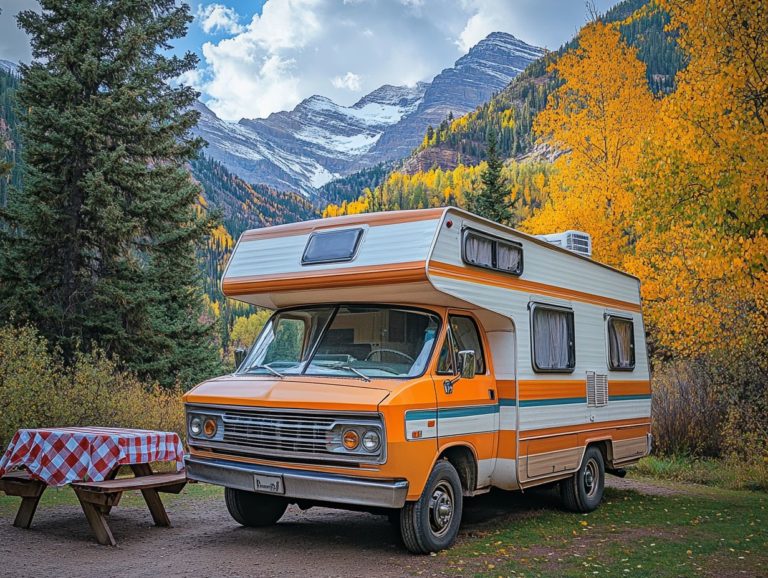What is Coverage for Utility Vehicles?
When insuring utility vehicles, it s important to understand your coverage options. These vehicles require specific insurance plans tailored to their unique needs.
This article covers the types of insurance available for utility vehicles, including liability and physical damage protection, while examining the key factors that affect insurance rates.
By the end, you ll have the knowledge to confidently assess your requirements and compare quotes, ensuring you select the ideal coverage for your utility vehicle.
Contents
- Key Takeaways:
- Understanding Coverage for Utility Vehicles
- Types of Coverage Available
- Factors Affecting Coverage for Utility Vehicles
- Driver s History
- Choosing the Right Coverage
- Frequently Asked Questions
- What is Coverage for Utility Vehicles?
- What types of coverage are included for utility vehicles?
- Do I need coverage for my utility vehicle?
- Are there any specific factors that affect coverage for utility vehicles?
- Can I purchase additional coverage for my utility vehicle?
- How can I find the best coverage for my utility vehicle?
Key Takeaways:

- Utility vehicles are defined as vehicles primarily used for business or commercial purposes and require specialized insurance coverage.
- Coverage options for utility vehicles include liability, physical damage, and uninsured/underinsured motorist coverage.
- Factors such as vehicle usage, location, and driver s history can impact the type and cost of coverage for utility vehicles.
Understanding Coverage for Utility Vehicles
Understanding coverage for utility vehicles, such as all-terrain vehicles (ATVs) and utility task vehicles (UTVs), means recognizing the array of insurance options available to safeguard both your vehicle and your finances.
Insurers like GEICO and Progressive offer tailored coverages designed to address the specific risks linked to off-road riding. Get ready! With the right insurance, you ll have the protection you need for every adventure!
Defining Utility Vehicles
Utility vehicles, encompassing both all-terrain vehicles (ATVs) and utility task vehicles (UTVs), are crafted to cater to a wide array of functions from recreation to agriculture and utility work offering remarkable versatility and performance on rugged terrains.
ATVs are typically more compact, enabling you to navigate tight spaces with ease, making them perfect for trail exploration or reaching hard-to-access spots. On the flip side, UTVs boast enhanced capacity, featuring larger cargo beds and seating for multiple passengers, making them the go-to choice for tasks that involve transporting goods or a crew, particularly in agricultural settings.
Renowned brands like Polaris, Can-Am, Honda, Yamaha, Kawasaki, and John Deere have established their presence in this arena, each delivering models tailored for specific applications. Whether your adventures take you farming, hunting, or simply enjoying the great outdoors, there s a utility vehicle designed to meet your every need and exceed your expectations.
Types of Coverage Available
When diving into the types of coverage available for utility vehicles, it s crucial to grasp the essential insurance options at your disposal.
Collision coverage, liability coverage, and comprehensive coverage each play a vital role in safeguarding you against the myriad risks associated with riding or operating these vehicles. Understanding these options enables you to make informed decisions and ensures that you re adequately protected on the road.
Liability Coverage
Liability coverage is an essential part of your ATV and UTV insurance, specifically designed to protect you financially if you cause injury to someone or damage their property.
As a utility vehicle owner, grasping the nuances of this coverage is vital. It not only protects your finances but also grants you peace of mind while enjoying your recreational activities. Should an accident occur, liability coverage steps in to handle medical expenses for the injured or repairs for damaged property, effectively reducing your out-of-pocket costs.
Keep in mind that coverage limits can vary based on your policy and provider. Companies like GEICO, for example, offer a variety of liability options, enabling you to customize your coverage to suit your specific needs and concerns about your vehicles.
Ready to find the best insurance for your utility vehicle? Start comparing quotes today!
Physical Damage Coverage

Physical damage coverage includes collision coverage and comprehensive coverage, both essential for protecting your utility vehicle investment.
Understanding these two types of coverage is crucial for protecting your investment. Collision coverage helps when your vehicle hits another vehicle or object, making it perfect for unexpected road mishaps.
Comprehensive coverage protects you from more than just collisions. It covers damage from events like theft, vandalism, or natural disasters, giving you peace of mind in various situations.
Getting an insurance quote is a smart move! It helps you find the best deal for your needs, allowing you to make informed decisions about your insurance policies.
Uninsured/Underinsured Motorist Coverage
Uninsured and underinsured motorist coverage is a vital part of your utility vehicle insurance. It protects you in accidents with drivers who don t have enough insurance to cover your damages.
This coverage acts as a safety net, ensuring you re not left financially exposed due to someone else s negligence. By choosing this protection, you can shield yourself from hefty out-of-pocket expenses like medical bills and vehicle repairs.
As you assess your insurance options, adding this coverage can enhance your peace of mind, allowing you to drive confidently, knowing your finances are secure.
Factors Affecting Coverage for Utility Vehicles
Several factors influence coverage for utility vehicles, such as your vehicle usage, geographic location, and driving history. Each of these elements significantly impacts both the cost and availability of insurance coverage.
Vehicle Usage
The way you use your utility vehicle plays a crucial role in shaping your insurance coverage and premium.
Different rates apply depending on whether you re using it for recreational activities or work-related tasks. For example, if you frequently navigate challenging off-road conditions for agricultural purposes or transporting heavy equipment, insurers may need a specialized policy due to greater risks.
On the other hand, if you re using it for leisurely weekend adventures, you might find more flexible coverage options and potentially lower rates.
Don t wait! Assess your daily and seasonal usage patterns now to find the best insurance for you.
Location
Your geographic location significantly affects your utility vehicle insurance coverage. Various risk factors, such as accident and crime rates, shape premium costs and available options.
In rural areas, the lower population density typically leads to fewer accidents, which can result in lower premiums. However, you might find the selection of insurance providers limited, forcing you to choose from fewer options.
In contrast, urban environments, with their higher rates of accidents and theft, often see costs rise, pushing drivers to consider more full coverage options.
This contrast not only affects pricing but also shapes the types of protections you might seek based on your specific driving experiences and local conditions.
Driver s History

A driver’s history, including previous claims and driving records, plays a crucial role in shaping the insurance coverage and potential discounts available for utility vehicles.
When insurers assess premiums, they carefully look at how your past behavior on the road reflects your current risk level. A clean driving record usually leads to lower rates, showing responsible driving habits and decreasing the likelihood of future claims.
If your history includes frequent claims, you may face increased premiums, indicating to insurers that you could be a higher risk. Manage your claims effectively to secure better rates. A well-maintained record not only helps you get better pricing but also broadens your future coverage options.
By actively managing your driving history, you can enjoy significant long-term benefits.
Choosing the Right Coverage
Selecting the ideal coverage for your utility vehicle requires a thoughtful assessment of your specific needs. A clear understanding of the available options and careful comparison of quotes from various insurance providers is essential.
This approach helps you find the best fit for your unique situation, ensuring you make an informed decision tailored to your requirements.
Evaluating Your Needs
Evaluating your needs is the crucial first step in selecting the right insurance coverage for your all-terrain or utility vehicle. Align your coverage options with how you intend to use the vehicle and the unique risk factors involved.
Consider factors such as:
- How often you plan to use the vehicle
- The types of terrains you’ll tackle
- Your overall budget
Safety considerations are equally important. Understanding the inherent risks of different driving environments is essential for making informed choices.
Exploring various insurance options can lead you to better protection. You may find policies specifically designed for recreational use or commercial activities.
By thoughtfully addressing these elements, you can secure the best insurance solution tailored to your lifestyle.
Comparing Quotes from Different Providers
Comparing quotes from different insurance providers like GEICO and Progressive is crucial for finding the most suitable coverage for your utility vehicle. This process allows you to assess pricing and the reliability of customer service.
When analyzing various offers, look for potential savings while ensuring you have adequate protection tailored to your specific needs. Consider key factors such as:
- Coverage limits, which determine your financial protection in case of an accident
- Deductibles, the amount you pay out of pocket before insurance kicks in
Don t overlook the importance of customer service. A responsive and helpful insurer can significantly enhance your overall experience. Communicate effectively with insurers by asking the right questions, clarifying terms, and negotiating to secure the best possible deal for yourself.
Frequently Asked Questions
What is Coverage for Utility Vehicles?

Coverage for utility vehicles refers to the protection provided by insurance for these types of vehicles. It includes various types of coverage, such as liability, collision, and comprehensive, to ensure that the vehicle and its owner are financially protected. Additionally, it’s important to understand coverage for vehicle modifications that may be necessary for customized utility vehicles.
What types of coverage are included for utility vehicles?
The types of coverage included for utility vehicles vary depending on the insurance policy. Common types include:
- Liability: Covers damages to other people or property caused by your vehicle.
- Collision: Covers damages to your vehicle caused by an accident.
Do I need coverage for my utility vehicle?
Yes, it is highly recommended to have coverage for your utility vehicle. Not only is it required by law in many states, but it also provides financial protection in case of accidents, theft, or other unforeseen events.
Don’t forget to compare your options and reach out for personalized quotes to find the best coverage for your needs!
Are there any specific factors that affect coverage for utility vehicles?
Yes, several factors can influence coverage for utility vehicles. These include the vehicle’s type, model, usage, the driver’s age and history, and the primary location of use.
Can I purchase additional coverage for my utility vehicle?
Yes, you can add extra coverage to your utility vehicle. This includes comprehensive insurance, which protects against non-collision damage like storms or theft, and additional liability coverage for greater financial safety.
How can I find the best coverage for my utility vehicle?
Research different insurance providers to find the right coverage. Compare policies and prices, and consult a licensed insurance agent for personalized advice tailored to your needs and budget.






